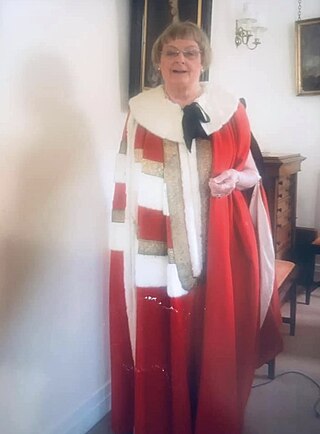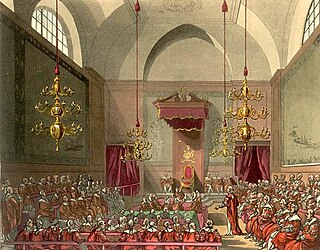
The House of Lords is the upper house of the Parliament of the United Kingdom. Like the lower house, the House of Commons, it meets in the Palace of Westminster in London, England. One of the oldest institutions in the world, its origins lie in the early 11th century and the emergence of bicameralism in the 13th century.
Peerages in the United Kingdom form a legal system comprising both hereditary and lifetime titles, composed of various ranks, and within the framework of the Constitution of the United Kingdom form a constituent part of the legislative process and the British honours system. The British monarch is considered the fount of honour and is notionally the only person who can grant peerages, though there are many conventions about how this power is used, especially at the request of the British government. The term peerage can be used both collectively to refer to the entire body of titled nobility, and individually to refer to a specific title. British peerage title holders are termed peers of the Realm.

The Peerage Act 1963 is an Act of the Parliament of the United Kingdom that permits women peeresses and all Scottish hereditary peers to sit in the House of Lords and allows newly inherited hereditary peerages to be disclaimed.
The Peerage of Scotland is one of the five divisions of peerages in the United Kingdom and for those peers created by the King of Scots before 1707. Following that year's Treaty of Union, the Kingdom of Scots and the Kingdom of England were combined under the name of Great Britain, and a new Peerage of Great Britain was introduced in which subsequent titles were created.
In the United Kingdom, representative peers were those peers elected by the members of the Peerage of Scotland and the Peerage of Ireland to sit in the British House of Lords. Until 1999, all members of the Peerage of England held the right to sit in the House of Lords; they did not elect a limited group of representatives. All peers who were created after 1707 as Peers of Great Britain and after 1801 as Peers of the United Kingdom held the same right to sit in the House of Lords.

The House of Lords Act 1999 is an Act of the Parliament of the United Kingdom that reformed the House of Lords, one of the chambers of Parliament. The Act was given Royal Assent on 11 November 1999. For centuries, the House of Lords had included several hundred members who inherited their seats ; the Act removed such a right. However, as part of a compromise, the Act did permit ninety-two hereditary peers to remain in the House. Another ten were created life peers to enable them to remain in the House.

A Lord of Parliament was the holder of the lowest form of peerage, entitled as of right to take part in sessions of the pre-Union Parliament of Scotland. Since that Union in 1707, it has been the lowest rank of the Peerage of Scotland, ranking below a viscount. A Lord of Parliament is said to hold a Lordship of Parliament.

Lord Saltoun, of Abernethy, is a title in the Peerage of Scotland. It was created in 1445 for Sir Lawrence Abernethy. The title remained in the Abernethy family until the death in 1669 of his descendant the tenth Lady Saltoun. She was succeeded by her cousin Alexander Fraser, the eleventh Lord. He was the son of Alexander Fraser and Margaret Abernethy, daughter of the seventh Lord Saltoun. The title has remained in the Frasers of Philorth family ever since.

Robert Michael James Gascoyne-Cecil, 7th Marquess of Salisbury, Baron Gascoyne-Cecil,, is a British Conservative politician. From 1979 to 1987 he represented South Dorset in the House of Commons, and in the 1990s he was Leader of the House of Lords under his courtesy title of Viscount Cranborne. Lord Salisbury lives in one of England's largest historic houses, the 17th-century Hatfield House in Hertfordshire, and currently serves as Chancellor of the University of Hertfordshire.
The hereditary peers form part of the peerage in the United Kingdom. As of August 2023, there are 805 hereditary peers: 30 dukes, 34 marquesses, 189 earls, 110 viscounts, and 442 barons.
In the United Kingdom, life peers are appointed members of the peerage whose titles cannot be inherited, in contrast to hereditary peers. Life peers are appointed by the monarch on the advice of the Prime Minister. With the exception of the Dukedom of Edinburgh awarded for life to Prince Edward in 2023, all life peerages conferred since 2009 have been created under the Life Peerages Act 1958 with the rank of baron and entitle their holders to sit and vote in the House of Lords, presuming they meet qualifications such as age and citizenship. The legitimate children of a life peer appointed under the Life Peerages Act 1958 are entitled to style themselves with the prefix "The Honourable", although they cannot inherit the peerage itself. Prior to 2009, life peers of baronial rank could also be so created under the Appellate Jurisdiction Act 1876 for senior judges.

The Titles Deprivation Act 1917 is an Act of Parliament of the United Kingdom which authorised enemies of the United Kingdom during the First World War to be deprived of their British peerages and royal titles.

The Life Peerages Act 1958 established the modern standards for the creation of life peers by the Sovereign of the United Kingdom.

Marjorie Flora Fraser, 21st Lady Saltoun, is a Scottish peer. Until her retirement on 12 December 2014, she was the only holder of a lordship of Parliament who had a seat in the House of Lords as an elected hereditary peer. Lady Saltoun is the Chief of the Name and Arms of Clan Fraser since 1 May 1984, by decree of the Court of the Lord Lyon. She is also the head of the Scottish lowland family the Frasers of Philorth.

The Lords Temporal are secular members of the House of Lords, the upper house of the British Parliament. These can be either life peers or hereditary peers, although the hereditary right to sit in the House of Lords was abolished for all but ninety-two peers during the 1999 reform of the House of Lords. The term is used to differentiate these members from the Lords Spiritual, who sit in the House as a consequence of being bishops in the Church of England.

The reform of the House of Lords, the upper house of the Parliament of the United Kingdom, has been a topic of discussion in UK politics for more than a century. Multiple governments have attempted reform, beginning with the introduction of the Parliament Act 1911 by the incumbent Liberal Government, which stated:
...whereas it is intended to substitute for the House of Lords as it at present exists a Second Chamber constituted on a popular instead of hereditary basis, but such substitution cannot be immediately brought into operation

Nicholas Le Poer Trench, 9th Earl of Clancarty, 8th Marquess of Heusden, is an Anglo-Irish peer, as well as a nobleman in the Dutch nobility. Lord Clancarty serves as an elected Crossbench hereditary peer in the British House of Lords. His earldom is in the Peerage of Ireland.
Following the enactment of the House of Lords Act 1999, the number of hereditary peers entitled to sit in the House of Lords was reduced to ninety-two. The Earl Marshal and the Lord Great Chamberlain were entitled to sit ex officio; the remaining ninety were elected by all the hereditary peers before the passing of the reform. Since November 2002, by-elections have been held to fill vacancies left by deaths, resignations or disqualifications of those peers. Since the passing of the House of Lords Reform Act 2014, by-elections have also been held to fill vacancies left by the retirements of those peers.









